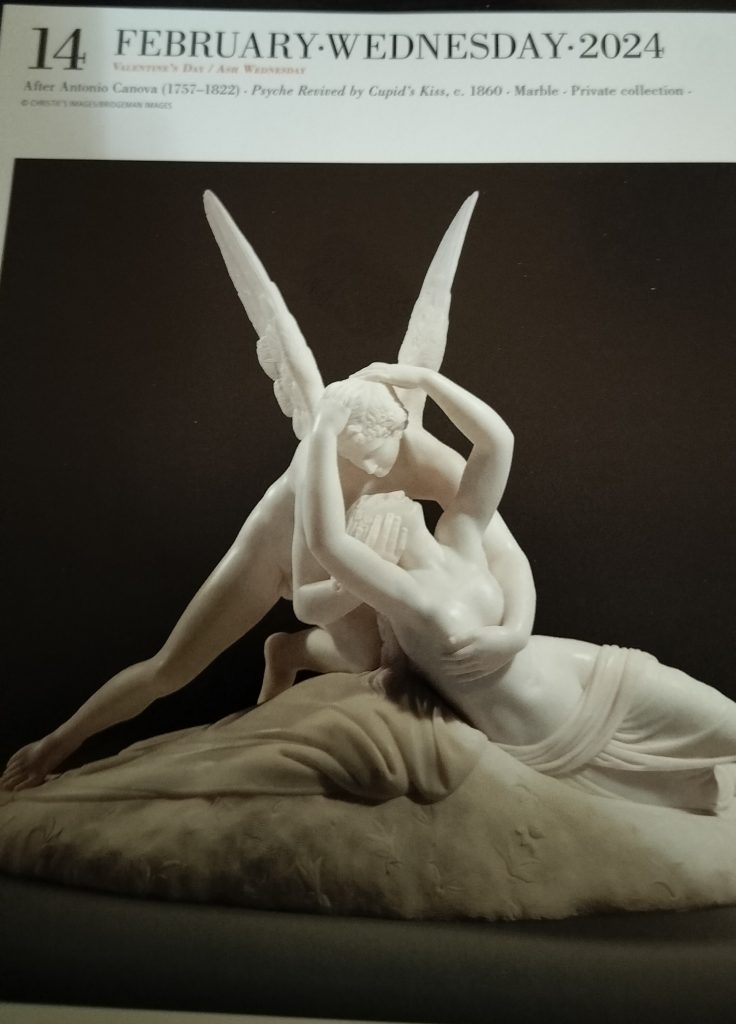Ash Wednesday coming on the 14th of February this year has brought to my mind the connection between the Gospel — humanity’s fall and separation from her Father and her Groom, and then the rescue and reconciliation by that Groom — and the images in story.
In the story of Cupid and Psyche, images taken from Greek mythology and used in a fairy tale fashion by Apuleius in the 2nd century A.D., Psyche has incurred the wrath of the jealous goddess Venus (think Satan as he looks upon the innocent Adam and Eve in the Garden), and Venus assigns her son Cupid to make Psyche fall in love with some ‘low, mean, unworthy being’. Cupid ends up falling in love with Psyche himself, and….stuff happens. Fast forward to near the end, where we are at the bottom of the U shape of our story. Due to a couple of acts of disobedience (the short version), Psyche has fallen ‘down in the midst of the road, a sleepy corpse without sense or motion.’ Cupid, in the meantime, [you’re just going to have to read the story linked above to know what all happened between his falling in love with her, secretly marrying her, keeping himself secret from her, then her disobedience to the one restriction and wounding him…] ‘being now recovered from his wound, and not able longer to bear the absence of his beloved Psyche…flew to the spot where Psyche lay, and gathering up the sleep from her body closed it again in the box, and waked Psyche with a light touch of one of his arrows.’ And then they really get married, and she gets immortality.
So here we have the god of Love, rescuing his bride, even though she had been unfaithful in her promise to him, and in that disobedience had actually wounded him.
I think of what this day, Ash Wednesday, means to many Christians around the world. It is a day of humbling, to remember that from ashes we came and from ashes we will go. It is a day to remember that it is our sin, our disobedience, that put Him on that cross.
For our sake he made him to be sin who knew no sin, so that in him we might become the righteousness of God. ~ 2 Corinthians 5:21
Surely he hath borne our griefs, and carried our sorrows: yet we did esteem him stricken, smitten of God, and afflicted.
But he was wounded for our transgressions, he was bruised for our iniquities: the chastisement of our peace was upon him; and with his stripes we are healed. ~ Isaiah 53: 4,5
In the story of Snow White, after her death and the dwarfs placing her in the glass coffin, a son of a king comes to the dwarfs’ home, seeking shelter, and immediately is taken with the beautiful corpse in that glass coffin. He asks to be able to take the corpse with him, but the dwarfs refuse at first, but after his second appeal — ‘I cannot live without being able to see Snow-White. I will honor her and respect her as my most cherished one’ — he is allowed to take her home with him. In our modern sensibilities this seems kind of freaky —- Dude is in love with a corpse and wants to take it home. But here is where we must all learn how to read metaphorically, and when we give ourselves time to contemplate this image, we remember —
But God, who is rich in mercy, for his great love wherewith he loved us, Even when we were dead in sins, hath quickened us together with Christ ~Ephesians 2: 4,5
But God commendeth his love toward us, in that, while we were yet sinners, Christ died for us. ~ Romans 5:8
On this day devoted to Love, remember that the true God of Love, looked at us ‘fallen asleep’ because of disobedience, ‘dead’ because of sin, and Loved us. Though we deserved to die, he became a substitute on the Cross, successfully harrowed Hell and rescued his Bride (unlike Orpheus), and brings his Bride home to his Father’s house.
Please remember that reading metaphorically is not operating with an equal sign. Most certainly the Cupid of story is not exactly Christ. Allegory shows us images that are like something else — in some way, not completely. When we relate the images to other stories or things we know about nature, we can take that understanding of the real thing or event deeper. Jesus knew the effect that parables would have on our hearts and minds. ‘The kingdom of Heaven is like…’ It is in looking at the images that are like in some way to Christ, such as the story of Orpheus, which I related here, that my knowledge and gratitude for the reality of what we have in Christ grows deeper.
Happy Love Day! And may you always remember with humility that we were loved even in our ashes.







